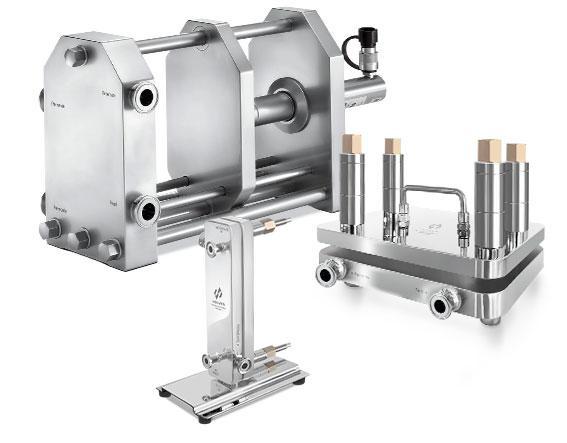What is Tangential Flow Filtration (TFF)?
Tangential Flow Filtration (TFF) is a filtration process used in bioprocessing and laboratory applications to separate particles, macromolecules, and contaminants from a liquid stream. Unlike conventional filtration, where the fluid passes through a filter directly, TFF uses a cross-flow mechanism where the liquid flows tangentially across the filter surface. This helps maintain high flow rates, reduce fouling, and enhance the efficiency of the filtration process.
What are Tangential Flow Filtration Cassettes?
Tangential Flow Filtration Cassettes are specialized filter devices used in TFF systems. They consist of multiple filtration membranes contained within a housing that allows for continuous cross-flow filtration. These cassettes come in various sizes and configurations, depending on the application, and are used for separating, concentrating, or purifying biological fluids, proteins, cells, and other materials.
Where are Tangential Flow Filtration Cassettes commonly used?
TFF cassettes are widely used in the following applications:
1. Biopharmaceutical Industry: In the production of therapeutic proteins, monoclonal antibodies, and vaccines, TFF cassettes are employed for protein concentration, buffer exchange, and virus removal.
2. Cell Culture and Harvesting: TFF is used to concentrate cell cultures and harvest proteins or cells from culture media in processes like cell therapy or gene therapy manufacturing.
3. Water Purification: In laboratory settings and some industrial processes, TFF cassettes are used for water filtration to remove contaminants, bacteria, and particles.
4. Food and Beverage Processing: TFF is utilized in dairy processing, such as the concentration of milk or whey protein.
How do Tangential Flow Filtration Cassettes work?
The working principle of TFF cassettes involves a cross-flow system where the liquid being filtered flows tangentially across the surface of the membrane. This design ensures that:
1. Solids and larger particles are retained on the surface of the membrane.
2. The filtered liquid (permeate) passes through the membrane into the collection chamber.
The continuous movement of the liquid across the membrane helps minimize fouling and clogging, which is a common issue in conventional filtration methods.
What are the advantages of using TFF cassettes?
1. Higher Efficiency: TFF systems are known for their high filtration capacity and efficiency. Because the liquid flows tangentially, it can process large volumes without significant loss of flow rate or filtration performance.
2. Reduced Fouling: The cross-flow design helps reduce the accumulation of particles on the membrane surface, preventing clogging and ensuring consistent performance over time.
3. Scalability: TFF cassettes can be easily scaled from laboratory to production levels, making them highly adaptable for different stages of a bioprocess or manufacturing line.
4. Flexibility: TFF cassettes are available in various sizes, materials, and configurations, allowing them to be tailored for specific applications, whether it's for protein purification or cell concentration.
5. Continuous Processing: TFF allows for continuous processing of fluids, which is crucial for industries requiring high throughput, such as biopharmaceuticals and food production.
What are the key considerations when selecting TFF cassettes?
When choosing TFF cassettes, several factors should be considered:
1. Membrane Material: The material should be compatible with the fluid being filtered. Common materials include polyethersulfone (PES), polyvinylidene fluoride (PVDF), and regenerated cellulose.
2. Pore Size: Depending on the application, the pore size of the membrane will vary. For instance, protein concentration may require a larger pore size than virus filtration.
3. Flow Rate and Capacity: The cassette should be chosen based on the desired flow rate and the volume of liquid to be processed.
4. Chemical Compatibility: It’s important to ensure the cassette can withstand the chemicals and solvents present in the filtration process without degradation.
5. Temperature Range: Consider the temperature of the fluid being filtered. Some materials may not perform well at high temperatures, so selecting a cassette that suits the thermal conditions is crucial.
What are some challenges with using TFF cassettes?
1. Membrane Fouling: While TFF minimizes fouling compared to other filtration methods, it can still occur over extended use, requiring cleaning or replacement of the membranes.
2. Initial Cost: TFF systems and cassettes can have a higher initial investment compared to traditional filtration methods, although they offer long-term efficiency.
3. Maintenance: Continuous monitoring and maintenance are necessary to ensure optimal performance, especially in large-scale operations.
What is the future of Tangential Flow Filtration Cassettes?
With advancements in biotechnology and increasing demand for high-quality biologics, the role of TFF cassettes is expected to expand. Future trends may include:
1. Integration with Automation: More automated TFF systems that can monitor filtration performance in real-time, reducing the need for manual oversight.
2. Improved Membrane Technology: Ongoing research in membrane materials will lead to better performance, increased durability, and lower costs.
3. Sustainability: There is a growing focus on creating more sustainable TFF systems, such as those that can reduce water consumption or use more environmentally friendly materials.

